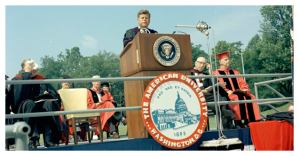 For in the final analysis, our most basic common link is that we all inhabit this small planet. We all breathe the same air. We all cherish our children’s futures. And we are all mortal.
For in the final analysis, our most basic common link is that we all inhabit this small planet. We all breathe the same air. We all cherish our children’s futures. And we are all mortal.
John F Kennedy, The American University, Commencement Address, 10 June, 1963
——————-
Yes, we are all mortal. That means we are all human. I just read the second article from this week lauding the humanities, from the Aspen Ideas Festival sponsored by the Aspen Institute and The Atlantic. In this article by Sophie Gilbert, Learning to Be Human: In an era fixated with science, technology, and data, the humanities are in decline. They’re more vital than ever., we find some great wisdom and counsel:
Drew Gilpin Faust, the president of Harvard University, and the cultural critic Leon Wieseltier agreed that true study and appreciation of the humanities is rooted in slowness—in the kind of deliberate education that can be accrued over a lifetime.
“The humanities are such an important vehicle for widening the world … for teaching empathy for people outside yourself,” Faust said. “In this time of increasing tribalism, this seems like such a critical role.” History teaches students about the context of choices made in the past. Philosophy forces them to think about morality. Theater, literature, and film put students into the mindset of others. In difficult times, people inevitably turn to the humanities to try to understand adversity. “People in trouble don’t turn to regression analysis,” Wieseltier said. “Their souls require the fortification and the wisdom that only humanistic thinking can provide.”
The time pressure is always so heavy, and so pervasive. We must finish this article, this project, this assignment. Even in our reading, we have to have summaries and synopses, because we do not have time to read slowly – to enjoy, and then really ponder and work on, what we’ve just read. (Yes, I plead guilty to providing some of those).
Recently, I re-read Getting Things Done by David Allen. No, it’s not a humanities classic. But, it is the modern time management classic. (And, the foreword was written by James Fallows, who writes for The Atlantic, and tweeted from the Aspen Ideas Festival). And, here’s what I discovered – I have not implemented all that I read from this book the first time I read it, or the second time, or… So, it’s back to working on his ideas, even today.
And I think I’ve made a personal discovery lately; at least I’ve observed this in myself. The more synopses I have prepared, the more slowly I am reading the books I present. It’s as though I look for every morsel of insight. I read, and I ponder.
I think I am embracing “slowness’ in my book reading life.
And, I think there is indeed something to this simple phrase: “rooted in slowness.” Maybe we all need to find time to read, and think, and ponder, more slowly.
